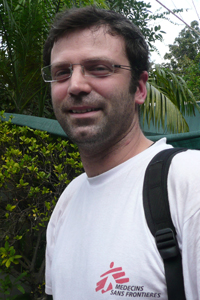An MSF doctor talks about the aftershock that occured one week after the January 12 earthquake
MSF emergency physician Sebastian Spencer was working at Choscal hospital in Cite Soleil, Port-au-Prince, on January 20 when the area sustained a strong aftershock. Here he describes what happened.
Doctors Without Borders/Médecins Sans Frontières (MSF) emergency physician Sebastian Spencer was working at Choscal hospital in Cite Soleil, Port-au-Prince, on January 20 when the area sustained a strong aftershock—one week after a 7.0-magnitude earthquake destroyed much of the capital. Dr. Spencer had just finished his second consecutive, hectic, 14-hour shift at the hospital hours before much-needed and delayed medical supplies that had been flown into the Dominican Republic arrived by truck. Here he describes what happened:
I understand you had another earthquake?
Yes, we had one this morning, 6.1, it was very frightening for everybody; staff, patients, we all ran out of the building. We carried the patients out and gathered in the inner courtyard of the hospital. Panic, especially amongst the Haitian national staff, the patients because they still remember the first one. They are just wondering when it is going to stop.
The Cité Soleil hospital, the Choscal hospital, wasn’t that much damaged by the first quake and now we have just noticed some new cracks in the building on the walls and the team is a little worried about continuing working inside. The operation theatre is quite far down in the building so to get out quickly is very difficult so we are actually considering having a tent outside to do the surgery.
What has been the affect on MSF’s care in the region?
Well, we had the opportunity last night, the surgical team worked very hard and did ten operations but the quake, the aftershock, happened after. The thing is that, because all the patents are outside we are not even able to provide shelter to them it is much more difficult to do the clinical follow-up, post-operative follow-up because of that, because we have to reorganize everything outside.
Most of the people are already in the hospital courtyard and have been treated initially, wound dressing, plasters, and now we have to do the backlog of the patients in need of life-saving or limb-saving surgery. There are old wounds and they get infected and we are facing a lot of gangrene and because of the shortage of equipment and amongst that the surgical equipment we are not able to provide the usual standard we want to achieve because of the short supply. It is very difficult so I would say, at the moment, the surgical care is sub-optimal because of that.
I talked about the surgical equipment but it is not just that. Last night we lacked plaster, we lacked for gloves, simple gloves to all the dressings because many wound dressings have to be done not daily but every two days. Just for that we don’t have enough equipment.
The wounds we are treating are things I have never seen before. They are high impact wounds, usually on one limb and they are terrible injuries and loads of them. It is not like you have a single case. You have got many of them.
The hope is that, with the equipment hopefully being shipped into Port-au-Prince, we will be able to do settings for fractures and provide that definitive surgical care. I hope that we will slowly diminish the backlog of patients and that we can go back to sort of normal activities for a hospital within a week. But on the other hand we have heard experts talking of more quakes within the next few weeks so I am not sure we will be able to do that.
You mentioned that you have been there for 48 hours and you are about to take a rest. How long before you go back on duty?
I have done two night shifts so far and these night shifts are about 14 hours long and now we are resting for about five hours and then we are back in the hospital. It is very tough for the staff but not just for the expat staff. The national staff have been on that sort of shift from the beginning, so I must say we are working well, the best we can, really.
All right Sebastian, I hope you get some rest, and good luck.
OK, thank you very much. Good bye.




